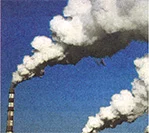CORPORATE CULTURE: Companies will act when there is a sense of responsibility in solving societal challenges
A revisit of 2015 reveals some of the most appealing and appalling climate change stories that were grabbing the global media headlines. It is no great exaggeration to say that climate change is real and. deserves serious attention.
Beginning with an optimistic note, 2015 indeed ended with a bang, as a climate deal of195 nations was sealed in the United Nations Climate Change Conference in December at the COP 21 in Paris. This deal was touted symbolic and hailed as the world’s greatest diplomatic success.
Also in 2015, two of the world’s biggest carbon emitters, China and the United States, have committed themselves to the decarbonisation of their economies over the course of this century. While China will be introducing market-based emission trading scheme (ETS) nationally by 2017, President Barack Obama’s launch of the Clean Power Plan is closer to a performance standards system backed by hundreds of big businesses, including eBay, Nestle, Unilever, L’Oreal and Levi Strauss.
Even Pope Francis had stepped out to make an ethical case for action on climate change in his encyclical, Loudata Si: On Careforour Common Home, that was released in June last year. He strongly emphasised on the “the ethical and spiritual roots of environmental problems”.
On the flipside, last year also highlights some of the most shocking corporate scandals relating to climate disaster in the history of mankind.
In September; a new investigation by Pulitzer prize-winning website Inside Climate News has shed unwanted light on ExxonMobil -the world’s fourth largest oil company was aware of the environmental effects of burning fossil fuels as early as the mid-1980s.
The corporation, however, had chosen to systematically spearhead and fund campaigns on the faux to climate change instead of alerting the public. Under its leadership in Global Climate Coalition, this group of fossil fuel corporations successfully lobbied the United States government against the rectification of the international agreement Kyoto Protocol to limit greenhouse gas emissions in 1997.
In the same month, German carmaker Volkswagen (VW) was embroiled in “diesel dupe” scandal. VW admitted to installing emissions test cheating software in up to 11 million of its diesel cars. VW’s defective vehicles could be responsible for nearly a million tonnes of air pollution every year, equivalent to all of the United Kingdom’s nitrogen oxide emissions from power stations, vehicles, industry and agriculture.
Closer to home, -raging blazes caused by slash-and-burn peatland and forest clearance in Indonesia has left the region shrouded by reeking smog and haze. This annual recurrence of fires and blame game is a result of nothing but a “collective negligence” of companies, smallholders and government. A World Bank report estimated that the cost of forest fires to the Indonesian economy last year is around US$16 billion (RM68.8 billion), equivalent to 1.9 per cent of its predicted gross domestic product.
That being said, corporate ethics are now being called into question around the world.
Earth has entered into a new geological epoch. Evidence from a new study provides one of the strongest cases that the arrival of the “Anthropocene” -one defined by humanity’s imprint on the planet would mark the end of the Holocene, which began around 12,000 years ago.
This certainly brings back the discourse of ethics associated with capitalism by Adam Smith, which has interestingly enough relevance for individual conduct of the bourgeois commercial order in contemporary economic liberalism. The notion “invisible hands” coined by Smith in Wealth of the Nation in 1776 asserted that powerful forces of self-interest will guide resources to their most efficient uses.
In general, both business theory and practices enshrined in economics often neglect the relations between organisation objectives and its broader societal obligations.
Smoke rising from the chimneys of a power plant in Jilin, China, in 2014. China will be introducing a market-based emission trading scheme by next year
Smith’s complex discussion, as such, is reduced to a plea for free trade economies. Partly, this narrative is used to justify an egocentric attitude and a market viewed in the absence of ethical reflection. In contrast, far from that, his earlier work on Theory of Moral Sentiments in 1759 indicates that civic role cannot be separated from the economic endeavour and implies responsibilities in the business sphere.
Now, this has profound implications in economics and in applied ethics. Climate change actions can be prompted, only with an increasing convergence around a sense of connectedness and responsibility in solving societal challenges.
This begs the question: How various stakeholders are internalising their negative externalities as an integral part of their corporate culture and management system?
The pertinent issue here is to invent a new model that connects corporate and societal value creation. Externalities cost can no longer be viewed in isolation from financial performance.
The reason for this is straightforward: climate change will impact the key drivers of corporate value: revenues, costs and risk. Not only are the effects of negative externalities of climate change are becoming impossible to ignore, the public awareness and understanding of corporate externalities have also grown tremendously.
For the people who embrace change, “the test of a first-rate intelligence”, as Scott Fitzegerald stupendously wrote, is “the ability to hold two opposed ideas in the mind at the same time, and still retain the ability to function”.
Although last year has offered us both sense of hope and hopelessness, it is true grit that will turn hopelessness into otherwise for this year and beyond.
Article by Michelle Kwa which appeared in New Straits Times, January 19, 2016.





